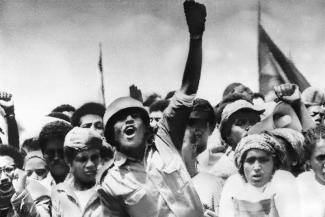Summer special
A changing country

Maaza Mengiste was born in Addis Ababa in 1971, when the country was haunted by drought and people protested against Emperor Haile Selassie. The military organised a coup against the monarch in 1974 and established a Communist dictatorship. Mengiste illustrates those grim years with a stirring family story.
As many Ethiopians did, Maaza Mengiste and her family left the country in 1975. After short stays in Kenya and Nigeria, they settled in the USA. In 2010 Mengiste published her first novel “Beneath the Lion’s Gaze” after obtaining a degree in creative writing from New York University.
Mengiste tackles the deep divide in Ethiopia’s population in the 1970. Her protagonists are a well situated family. The father is a doctor and royalist, and the youngest son, Dawit, is a revolutionary. The father denies the problems the country has and tries to hold his family together. Dawit seals himself off, joins an underground movement and distributes protest pamphlets.
Mengiste’s depiction of historical figures such as Emperor Haile Selassie is close to the historical truth. He ignored the people’s problems of hunger and inequality, and readers easily understand the people’s anger. Mengiste portrays the Communist regime, which called itself “Derg”, in an equally realistic way. The Derg came to power in 1974 and further ruined the country for 17 years.
Rejoicing at the monarchy’s overthrow did not last long. The Communists put Addis Ababa under strict curfews. They created a net of spies who reported prohibited “anarchist” behaviour. Opponents were tortured, and for deterrence, their dead bodies were laid out on display on the streets. Regional liberation movements fast emerged. In the novel, Dawit plays a major role in one of them.
Until today, there is no official death toll of Ethiopians during the Derg regime. International aid organisations estimate that half a million people were killed. In Mengiste’s novel, this turbulent history unfolds. She shows what it meant for the people, giving voices to simple farmers, loyal royalists, freedom fighters, rebels and frightened civilians. The British newspaper The Guardian considered “Beneath the Lion’s Gaze” one of the 10 best novels of 2010.
Rebecca Renz
Literature:
Maaza Mengiste, 2010: Beneath the Lion’s Gaze. New York: W.W. Norton & Company.







